|
|
|
Sort Order |
|
|
|
Items / Page
|
|
|
|
|
|
|
| Srl | Item |
| 1 |
ID:
119985
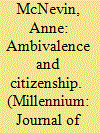

|
|
|
|
|
| Publication |
2013.
|
| Summary/Abstract |
Irregular migration gives rise to political claims that test the limits of political community and the expression of human rights in an increasingly interconnected world. This article provides a theorisation of the political claims of irregular migrants that starts with the notion of ambivalence. I argue that the ambivalence present in such claims can be understood as a political resource that is generative of new political relations across the terrain of human mobility and border control. In order to discern the generative quality of ambivalence, I argue in addition for an approach to theory production that is grounded in concrete migrant struggles. The argument is made via a critique of two theoretical perspectives that are influential amongst scholars working at the intersection of Migration Studies and Political and International Theory: the work of Giorgio Agamben and the 'Autonomy of Migration'. An approach that avoids the reductive accounts of power evident in both perspectives provides a better starting point from which to assess the transformative potential of irregular migrants' political claims.
|
|
|
|
|
|
|
|
|
|
|
|
|
|
|
|
| 2 |
ID:
090164
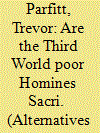

|
|
|
|
|
| Publication |
2009.
|
| Summary/Abstract |
This article examines how the concept of biopolitics is applied in development studies, focusing especially on Giorgio Agamben's account of biopolitics as intrinsic to the analysis of sovereignty and a state of exception. Agamben analyzes sovereignty as a biopolitical enterprise of disciplinary control in which sovereign power is able to enforce its role by the most draconian means while remaining nominally within the law. Agamben further claims that development is a biopolitical enterprise through which the Third World poor are reduced to a situation of bare life. The article interrogates this proposition, questioning how far biopolitics/development must necessarily be conceived as an exercise in oppression.
|
|
|
|
|
|
|
|
|
|
|
|
|
|
|
|
| 3 |
ID:
119950
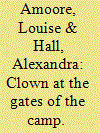

|
|
|
|
|
| Publication |
2013.
|
| Summary/Abstract |
This article considers the figure of the clown-fool as a way of approaching anew contemporary practices of sovereignty and resistance. The spectre of the camp as the nomos of modern sovereign power is widely critiqued for its neglect of the thriving and teeming life that actually accompanies the declaration of exception. The clown is an errant and troublesome figure whose life haunts the sovereign decision on exception. His presence in border-camp activism invokes a rich, provocative history in which the clown's foolish wisdom has critiqued the conceits of power. Yet, the clown's significance exceeds his traditional associations with carnivalesque misrule and mockery. Like homo sacer, the clown occupies an ambiguous position between political inclusion and exclusion, between inside and outside. In short, the sovereign needs the clown. His relation to resistance is thus also complex. The clown does not turn to face a locus of power as though it could be countered or overturned. Rather, he is the example par excellence of the resistance always already present within the exercise of power: standing not inside or outside the gates, but looking through, he dwells within the court but is not of its making. As a singularity akin to Deleuze's figurative children and Agamben's tricksters, the clown troubles the division between interior and exterior on which sovereign political life rests, a division that is also frequently replicated in understandings of resistance.
|
|
|
|
|
|
|
|
|
|
|
|
|
|
|
|
| 4 |
ID:
166772
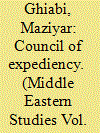

|
|
|
|
|
| Summary/Abstract |
Giorgio Agamben argues that in contemporary governance the use of ‘emergency’ is no longer provisional, but ‘constitutes a permanent technology of government’ and has produced the extrajudicial notion of crisis. The engendering of ‘zones of indistinction’ between the law and its practice is what Agamben defines as a ‘state of exception’. This article adopts the notion enunciated by Agamben and revisits it in the Islamic Republic of Iran. There, the category of crisis has been given, firstly, a juridical status through the institution of maslahat, ‘expediency’, interpreted in a secular encounter between Shica theological exegesis and modern statecraft. Secondly, crisis has not led to the production of a ‘state of exception’ as Agamben argues. Instead, since the late 1980s, a sui generis institution, the Expediency Council, has presided and decided over matters of crisis. Instead of leaving blind spots in the production of legislative power, the Expediency Council takes charge of those spheres of ambiguity where the ‘normal’ – and normative – means of the law would have otherwise failed to deliver. This is a first study of this peculiar institution, which invites further engagement with political phenomena through the deconstruction and theorization of crisis politics.
|
|
|
|
|
|
|
|
|
|
|
|
|
|
|
|
| 5 |
ID:
094319


|
|
|
|
|
| Publication |
2009.
|
| Summary/Abstract |
In the past decade there have been efforts to understand the war on terror through the writings of Michel Foucault and Giorgio Agamben. Some analyses reify certain concepts employed by Foucault and Agamben. Others do not accurately represent the actual occurrence of violence at ground level. Without claiming to present a sovereign gaze on the literature and the reading of sovereign violence in places such as Guántanamo, this article argues that there are at least three central elements that philosophers and theorists might want to reconsider in connection with sovereignty, biopower, and subjectivity: that there is a Derridean logic at play between sovereignty and biopower; that there is a connection between sovereignty and subjectivity informed by a "dangerous connection" between power and knowledge; and that sovereignty is informed by a classifying and hierarchizing regime characteristic of a regime of truth. Although Agamben claims to correct Foucault, he betrays important methodological and epistemological elements of Foucault's work. Nevertheless, there are elements in Agamben's work that can shape our understanding of a "biopolitical reading" of our contemporary era.
|
|
|
|
|
|
|
|
|
|
|
|
|
|
|
|
| 6 |
ID:
153140
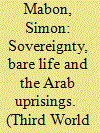

|
|
|
|
|
| Summary/Abstract |
Five years after people took to the streets in protest at political organisation across the Middle East, the consequences of these actions remain. As the protests gained traction, states began to fragment and regimes sought to retain power, whatever the cost. While a great deal of focus has been upon what happened, very little attention has been paid to the role of agency within the context of the fragmenting sovereignty and political change. This article contributes to these debates by applying the work of Giorgio Agamben to the post-Arab Uprisings Middle East, to understand the relationship between rulers and ruled along with the fragmentation of the sovereign state. The article argues for the need to bring agency back into conceptual debates about sovereignty within the Middle East. It concludes by presenting a framework that offers an approach building upon Agamben’s bare life.
|
|
|
|
|
|
|
|
|
|
|
|
|
|
|
|
| 7 |
ID:
145974
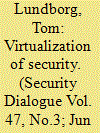

|
|
|
|
|
| Summary/Abstract |
During the last couple of decades, the virtual has emerged as a forceful conceptual tool in security studies. While used primarily in order to question assumptions about an objective truth concerning the meaning and value of security and different forms of insecurity, the implications of drawing on this concept vary considerably depending on how the virtual is conceptualized, and specifically how the potentiality of the virtual is linked to the process of actualization. Turning to the philosophies of Baudrillard, Agamben and Deleuze, as well as key thinkers in contemporary security studies, this article delineates three different approaches to analysing the virtualization of security. Focusing in particular on how these approaches point to contending views of ‘capture’ and ‘resistance’, it is argued that the choice of approach has serious implications for grasping what is at stake politically in the process of virtualization. These implications relate, more precisely, to how the virtual opens up and/or closes down the spaces of resistance that the modern subject of security traditionally has relied upon. In this way, the virtualization of security not only is important for thinking about capture and resistance, but challenges the very ground on which the modern subject of security rests.
|
|
|
|
|
|
|
|
|
|
|
|
|
|
|
|
| 8 |
ID:
168880
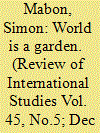

|
|
|
|
|
| Summary/Abstract |
Traditional approaches to questions about nomos in IR typically focus upon either its establishment and the formal structures that emerge through interaction within a clearly delineated spatial area, or an exploration of US hegemony in the post-2003 world. In this article I posit a different approach, building on the ideas of Giorgio Agamben, which grounds nomos as a spatialisation of the exception within conditions of neoliberal modernity. I suggest that within the global nomos are more localised nomoi. These localised nomoi are a consequence of the spatialisation of the exception and a fundamental tension between localisation and ordering. I argue that while sovereign power has been a source of contemporary scholarship, such explorations have paid scant attention to the regulatory power of normative values and their capacity to create order within space. Such norms allow for a greater awareness of how sovereign power can be mobilised in and of itself as a form of contestation. Locating such debates in the Middle East, I explore the concept of nomos to understand how struggle over the localisation and ordering of space helps us to better understand contemporary political life.
|
|
|
|
|
|
|
|
|
|
|
|
|
|
|
|
|
|
|
|
|